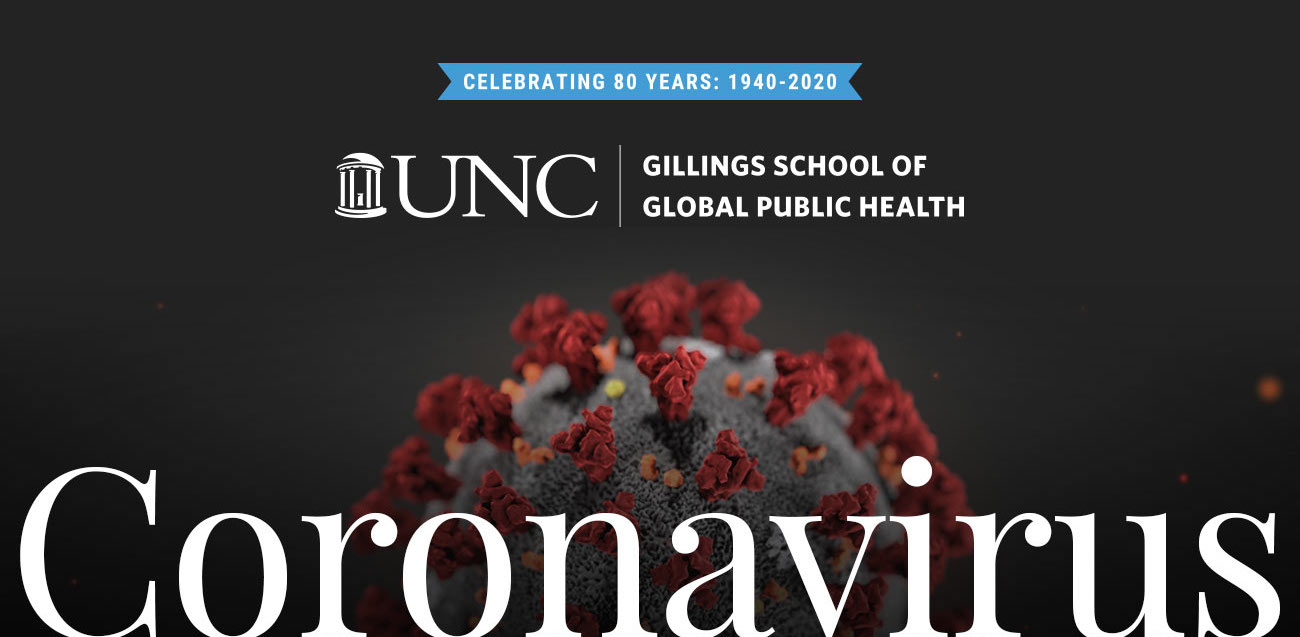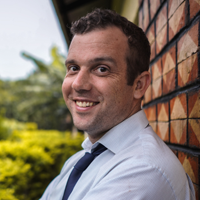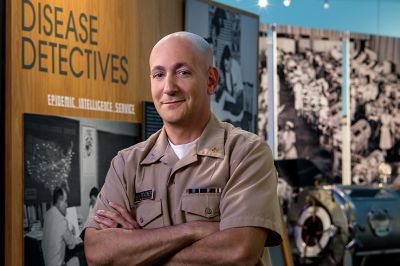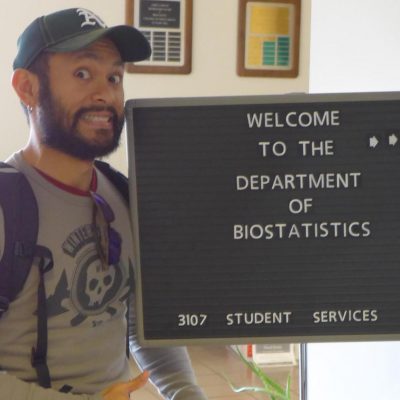The Gillings Community Responds to COVID-19: Tracking the Spread

May 18, 2020
The challenge that COVID-19 poses across the globe epitomizes the importance of public health education and research. At the UNC Gillings School of Global Public Health, students, alumni and faculty from across disciplines are working tirelessly to put learning into action in the face of a global health crisis.
Aiello to co-lead study assessing coronavirus community transmission among health care workers

Dr. Allison Aiello

Dr. Ross Boyce
North Carolina has an urgent need to track and assess the number of mild or asymptomatic COVID-19 infections among health care workers and their household contacts. Because these workers are potentially at a higher risk for exposure and infection compared to the general public, a team led by Allison Aiello, PhD, MS, professor of epidemiology at the Gillings School, and Ross Boyce, MD, MSc, assistant professor in the Division of Infectious Diseases at the UNC School of Medicine, is conducting a study to determine how these individuals may contribute to community transmission.
The team will analyze a randomly selected portion of clinical providers and ancillary staff working at UNC Medical Center, as well as their household members, to assess transmission dynamics outside of the hospital environment. The study aims to understand just how large the risks and rates of exposure are for these populations by monitoring these households for symptoms like fever or cough based on self-reported exposures and clinical test results. Household members that consent to participate in the study will be asked to complete an online questionnaire and self-collect nasal and serum specimens
Through this study, the team hopes to collect critical preliminary data about the prevalence of SARS-CoV-2 infection among front line health care workers, trends in new infection over time and transmission to their household members.
This data will help in estimating the prevalence of infection, evaluating success in efforts to control the spread and updating the models used to make projections about future cases. This information will also aid the development of screening and prevention measures that protect health care workers, patients and communities while minimizing the overuse of personal protective equipment.
Health behavior alumnus and CDC disease detective traces spread of coronavirus in community homes

Eric Pevzner
Alumnus Eric Pevzner, PhD, has been working for the Centers for Disease Control and Prevention (CDC) since earning his doctoral degree in health behavior from the Gillings School in 2005. While his interest in public and community health spans decades, he credits the time he spent at Gillings under the mentorship of Kurt Ribisl, PhD, chair and Jo Anne Earp Distinguished Professor of health behavior, for enabling the success of his career.
Pevzner is chief of the CDC’s Disease Detective program, known as the Epidemic Intelligence Service (EIS), where he leads a team of officers who currently spend much of their time investigating and responding to the COVID-19 pandemic. A majority of this work is done on foot, tracking the spread of the disease from person-to-person through a process called contact tracing – identifying a list of people that have been in contact with a person who tests positive for COVID-19. Pevzner is deployed in Utah, visiting homes of residents to find the best strategy to track and prevent the spread of the virus between household members.
“We’re coming in dressed in full PPE like they’ve never seen anywhere except in the movies, and they’re scared. They have a disease. They’re worried about their loved ones,” he recently told Freethink.
Even with fifteen years of experience with the EIS, COVID-19 has come as an entirely new challenge for Pevzner. Tracking the transmission of a disease when the world is still learning about how it spreads, the symptoms it produces and who it affects is a task like no other. And with limited testing and treatment options available, the effect the disease has had on communities in the United States and on the EIS itself has made an indelible impact on Pevzner
Read more about Pevzner’s work on COVID-19 contact tracing with the CDC.
Doctoral alumnus champions biostatistics in the fight against COVID-19

Eric J. Daza circa 2014 at the Department of Biostatistics of the Gillings School of Global Public Health.
In his recent article for Towards Data Science, alumnus Eric J. Daza (DrPH ‘15) writes that while it is encouraging that the coronavirus pandemic has greatly increased our understanding of the importance of fields like data science and epidemiology in order to track and model the spread of the disease, the field of biostatistics must not be overlooked.
Unlike more common types of data scientists, biostatisticians have specialized expertise in data collection and analysis that helps them recognize and address the unique complexities of health data. Their health-focused methodological training addresses a range of complications in statistical modeling, including selection bias, measurement error, demographics, survey sampling, study design and causal inference. Most importantly, biostatisticians are trained to work with epidemiologists and other health researchers in order to specifically address these complications in the process of creating statistical models.
“Biostatisticians are the original ‘full-stack’ data scientists of public health,” Daza writes. “Their deliverables, products and solutions have traditionally been study protocols, data collection procedures and statistical analysis plans at the start of a research study (ideally), and data management and analysis reports throughout. Their clients and customers have regularly included epidemiologists, other public health researchers (e.g., nutrition, health behavior, environmental and occupational health, maternal and child health), government agencies and institutes, clinical trialists, and pharma/biotech and life sciences companies.”
In a time when our understanding of COVID-19 is rapidly evolving, the rigorous expertise provided by biostatisticians is critical to implementing effective disease predictions and control strategies.
Read the full Medium piece at Towards Data Science.
See more general information about COVID-19 at the Gillings School’s Coronavirus Information Portal.
Read more about how Gillings students and alumni are responding to the COVID-19 pandemic in our previous feature.
Find a roundup of all our experts’ coronavirus-related media outreach in this Twitter moment.
Contact the UNC Gillings School of Global Public Health communications team at sphcomm@unc.edu.
